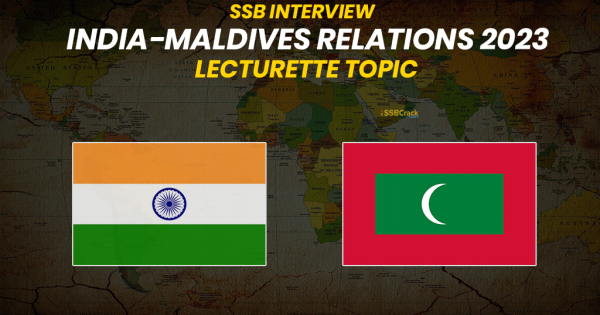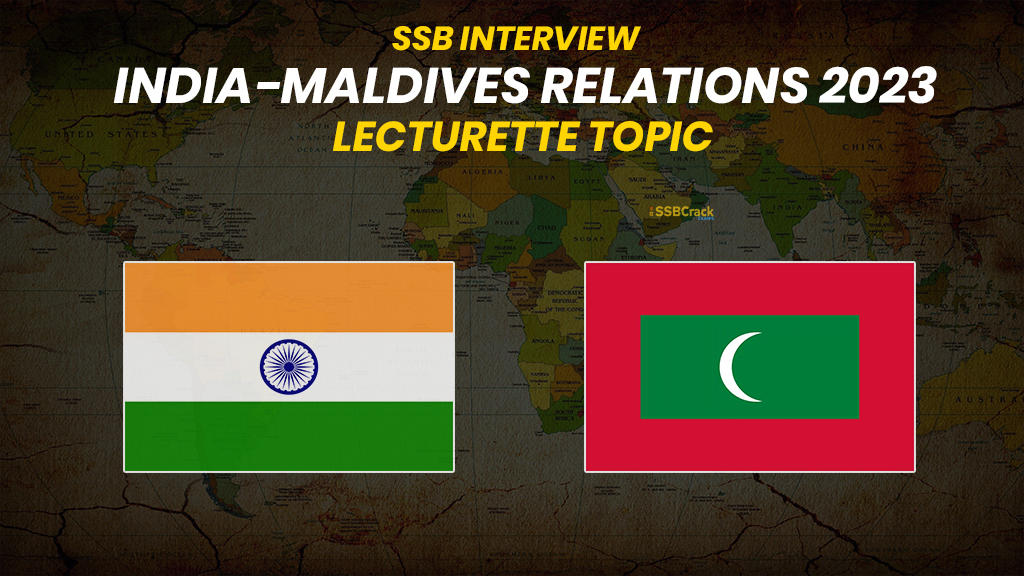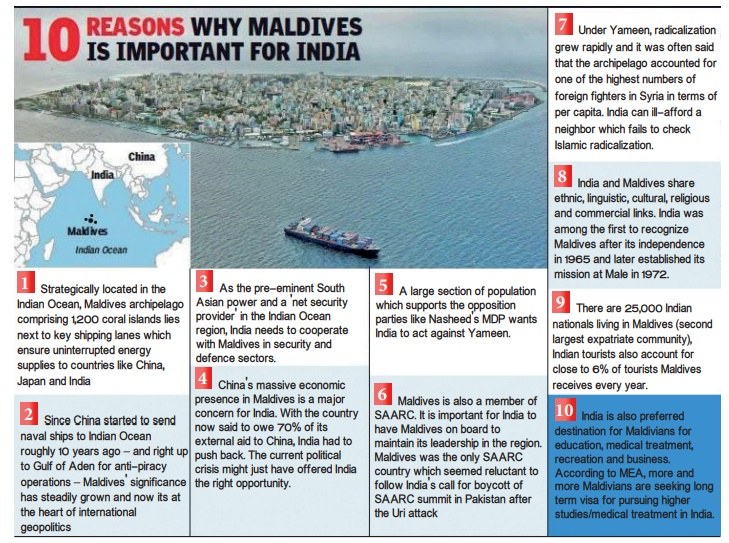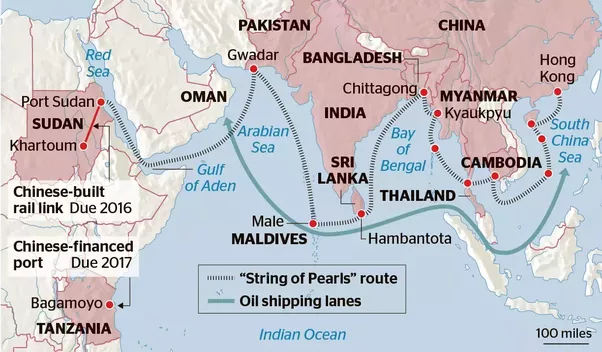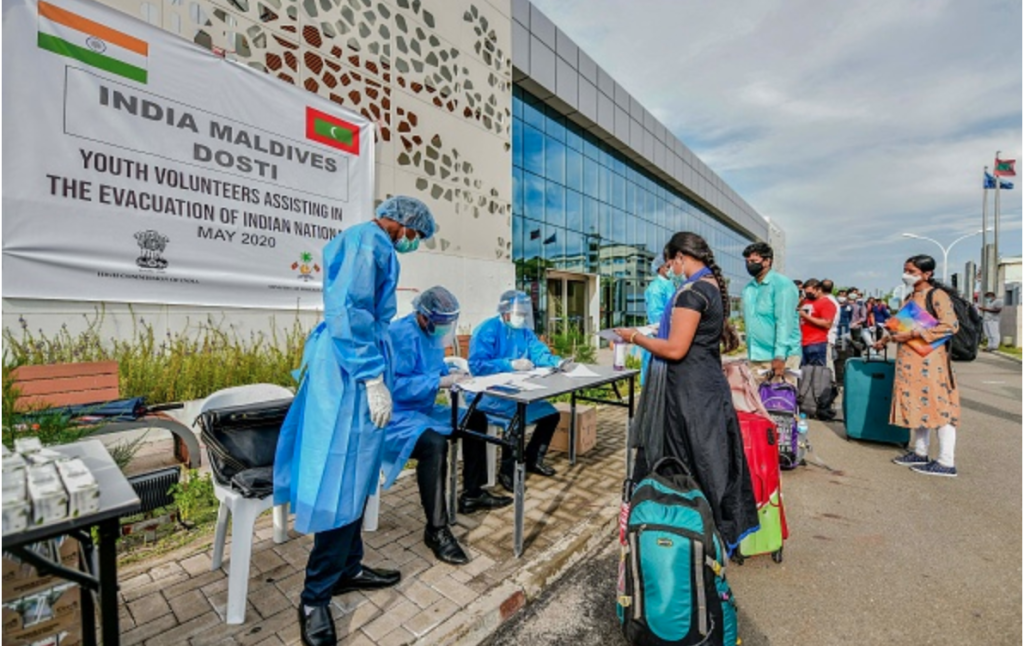India and the Maldives have a long and storied relationship dating back centuries. They share a common interest in promoting regional stability, maritime security, and economic development as two Indian Ocean neighbors. India was one of the first countries to recognize the Maldives’ independence in 1965, and the two countries have maintained close ties ever since. India has been a key development partner for the Maldives, assisting in areas such as infrastructure, education, and healthcare.
India – Maldives Relations
- India and the Maldives share a border. Since the Maldives’ independence from the British in 1965, India and the Maldives have maintained friendly relations.
- India aided the Maldives in a number of crisis situations, including the 1988 coup attempt, the 2004 tsunami, the 2014 water crisis, and, most recently, the Covid pandemic.
- The Maldives achieves food security through imports from India.
- India is investing in Maldives’ infrastructure projects.
- Both countries are cooperating in the fight against drug trafficking and terrorism.
- The Maldives’ economy is heavily reliant on fishing and tourism. Because India and the Maldives have friendly relations, the Maldives has long been a popular tourist destination for Indians.
- However, tensions in bilateral relations between India and the Maldives arose when the Maldives’ president, China-friendly Abdulla Yameen, took office in 2013.
- Ibrahim Solih was elected President of the Maldives in 2018, and bilateral relations have returned to normal.
- In 2020, Abdulla Yameen, the former president of the Maldives, launched the China-backed ‘India Out’ campaign in the country, which is based on misinformation and false propaganda and aims to disrupt bilateral relations. This campaign was opposed by the Maldives ruling party and other major parties. The campaign was banned by Maldivian President Ibrahim Mohamed Solih in April 2022.
- During his August 2022 visit to India, Maldives President Ibrahim Solih signed six key agreements with India to strengthen cooperation in capacity building, cyber security, housing, disaster management, and infrastructure development. These agreements contribute to the Maldives and India’s mutually beneficial relationship. During his visit, the Maldives’ president stated that the country will always adhere to the “India First” policy.
Challenges
- Domestic political grievances have weakened democratic institutions. If not effectively governed, a fragile democracy can be vulnerable to radical ideologies.
- Terrorism’s nerve center: The main drivers fueling the rise of Islamist radicalism in the island nation are political and socioeconomic instability.
- Saudi Arabia is radicalizing the Maldives. In terms of ISIS terrorists per capita, the Maldives had one of the highest numbers.
- Chinese influence in the Maldives: The increasing Chinese influence in the Maldives as a result of the planned or ongoing implementation of a large number of Beijing-led investment projects is a major source of concern for India.
- The Maldives has emerged as an important “pearl” in China’s “String of Pearls” South Asian construction.
- The long-standing controversy over the two Dhruv Advanced Light Helicopters (ALF) given to the Maldives by India in 2010 and 2015, both of which were used for ocean search-and-rescue operations, maritime weather surveillance, and airlifting patients between islands. Indian officers were sent to the Maldives to train the Maldives National Defence Force, which controls the helicopters.
Way Forward
- India is concerned about the mobilization of ordinary citizens through the ‘India Out’ campaign. “As a result, India must work on perception management in the Maldives, which the Indian High Commission can do.” They must first earn the people’s trust.”
- The potential for both countries to collaborate on adaptive and mitigating measures against climate change’s adverse maritime impacts is enormous.
- This capability must be realized through innovative foreign-policy and maritime security initiatives. While the Maldives’ recent ‘India-First Policy’ and India’s ‘Neighborhood First Policy’ appear to be mutually beneficial, the challenge lies in implementing these policies with cultural, geoeconomic, and geostrategic sensitivity.
- In this regard, India’s SAGAR vision has enormous potential.
- We cannot prevent China from entering the Maldives, but we must monitor its activities.
Conclusion
India and the Maldives have been maintaining good relations since the Maldives gained independence from the British. Even though a few disturbances came during Abdulla Yameen’s term, now both countries have a mutually beneficial relationship. The recent agreements between India and the Maldives will further strengthen bilateral relations.
To crack the SSB Interview and join the Indian Army as an Officer, You can join our SSB interview live classes batch and we recommend you to Enroll SSB INTERVIEW ONLINE COURSE. Trusted by thousands of defence aspirants.
Also Read:
- India-Bangladesh Relations: SSB Interview Lecturette Topic 2023
- India-Japan Relation: SSB Interview Lecturette Topic 2023
- Geopolitical Importance Of The Indian Ocean: SSB Interview Lecturette Topic 2023
- All About Paris Club: SSB Interview Lecturette Topic
- PM Narendra Modi Has Been Named The Most Popular Leader In The World
- Hindenburg Report On Adani – Here’s What You Need To Know
- India At WEF Davos Summit 2023: Here Are 10 Key Highlights
- Pakistan Economic Crisis 2023: SSB Interview Topic [Fully Explained]
- Joshimath Crisis: What Does “Land Subsidence” Mean, And Why Does It Happen?
- Top 10 Animal Conservation Projects In India [MUST WATCH]
- What Is Shanghai Cooperation Organisation (SCO) Summit 2022? [Fully Explained]
- 20 SSB Interview Questions On Russia Ukraine Crisis
- What Is The (India-Israel-UAE-USA) I2U2 Summit? [Fully Explained]
- What Is International North-South Transport Corridor (INSTC)?
- What Is Sri Lankan Crisis? [Fully Explained]
- What Is The BIMSTEC Grouping And How Is It Significant? [EXPLAINED]
- What Is The Places Of Worship (Special Provisions) Act, 1991? [Explained]
- What Is Bodo Accord | SSB Interview Notes [Fully Explained]
- What Is AFSPA: Armed Forces (Special Powers) Act?
- What Is G20 Or Group Of Twenty Countries?
- What Is AFSPA: Armed Forces (Special Powers) Act?
- What Is The Financial Action Task Force (FATF)? [Fully Explained]
- What Is Quadrilateral Security Dialogue (QUAD)?
- Difference Between NATO Vs Russia [Expained]
- What Is United Nations Security Council (UNSC) [Explained]
- Everything You Need To Know About SAARC: South Asian Association For Regional Cooperation
- All About Russia Ukraine War: SSB Interview Topic [Fully Explained]
